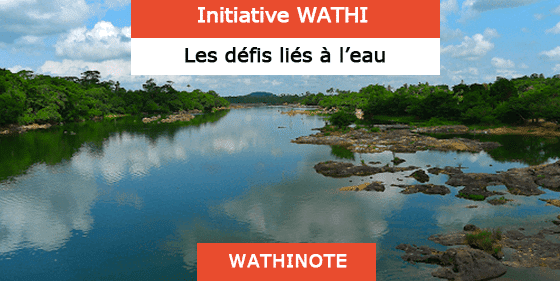

Author: Olufunke Cofie
Affiliated organization: International Water Management Institute
Site of publication: iwmi.cgiar.org
Type of publication: Article
Date of publication: December 2021
Vulnerable communities are benefiting from improved climate resilience and reduced water-related risks, as a new series of IWMI Water Issue Briefs shows.
In recent decades, water shortages in sub-Saharan Africa have become more intense and less predictable. According to the latest report published by the Intergovernmental Panel on Climate Change, West Africa could face particularly high-water risk. Largely dependent on rain-fed agriculture and already vulnerable to floods and droughts, the region faces declining crop yields by as early as 2050 if the large-scale water cycle changes already observed get any worse.
Climate change adaptation and mitigation measures are, therefore, essential to ensure long-term food security and sustainable development, and water is at the heart of all these measures.
Mainstreaming good agricultural water management practices
Rising temperatures and changing weather patterns are also increasing the urgency to mainstream good agricultural water management (AWM) practices.
IWMI’s emphasis on small-scale, farmer-led irrigation complements earlier trends in research and investments that prioritized public, communal irrigation schemes. At the small-scale level, IWMI’s research shows that when farmers take irrigation into their own hands, they are able to increase production, both by supplementing their rain-fed crops with irrigation water and by growing an additional harvest during the dry season.
Improved water access throughout the year could be particularly attractive to young farmers. In the Upper West Region of Ghana, where IWMI is investigating the link between climate change and migration, water stress due to unpredictable rainfall and poor management of water resources is among the factors causing young farmers to move to cities in search of new opportunities outside of agriculture.
Supporting post-Covid-19 recovery
More recently, the role of water in building resilience to systemic shocks, such as Covid-19, has made management of this valuable resource a renewed priority among policy makers and development planners.
IWMI is helping to inform national post-Covid-19 recovery plans by advising governments and environmental and health agencies. In Ghana, this took the form of a national policy dialogue to kickstart discussions on social transformation and inclusive development in a post-Covid-19 era. The dialogue focused on innovations and programs that will ensure sustainable growth and climate adaptation in the wake of the pandemic.
Water in a circular economy
In terms of sanitation and health, access to adequate amounts of clean water was a concern in West Africa even before the pandemic hit. IWMI has developed a range of approaches for safe waste management that aim to improve sanitation and enhance water, energy, and food security. These approaches include waste-based business models such as integrating aquaculture into wastewater treatment and converting fecal sludge into high-performance fertilizer. IWMI are now investigating options to scale up these approaches in ways that minimize environmental pollution and support a circular economy.
IWMI’s work makes it clear that new strategies and solutions are needed for more productive and sustainable water use in the face of changing climatic and demographic conditions. By providing solid evidence to guide the removal of technical, economic, social, and institutional barriers to the expansion of sustainable water management, IWMI is paving the way for sound policy making and investments that could benefit millions of people across West Africa.
Les Wathinotes sont soit des résumés de publications sélectionnées par WATHI, conformes aux résumés originaux, soit des versions modifiées des résumés originaux, soit des extraits choisis par WATHI compte tenu de leur pertinence par rapport au thème du Débat. Lorsque les publications et leurs résumés ne sont disponibles qu’en français ou en anglais, WATHI se charge de la traduction des extraits choisis dans l’autre langue. Toutes les Wathinotes renvoient aux publications originales et intégrales qui ne sont pas hébergées par le site de WATHI, et sont destinées à promouvoir la lecture de ces documents, fruit du travail de recherche d’universitaires et d’experts.
The Wathinotes are either original abstracts of publications selected by WATHI, modified original summaries or publication quotes selected for their relevance for the theme of the Debate. When publications and abstracts are only available either in French or in English, the translation is done by WATHI. All the Wathinotes link to the original and integral publications that are not hosted on the WATHI website. WATHI participates to the promotion of these documents that have been written by university professors and experts.
